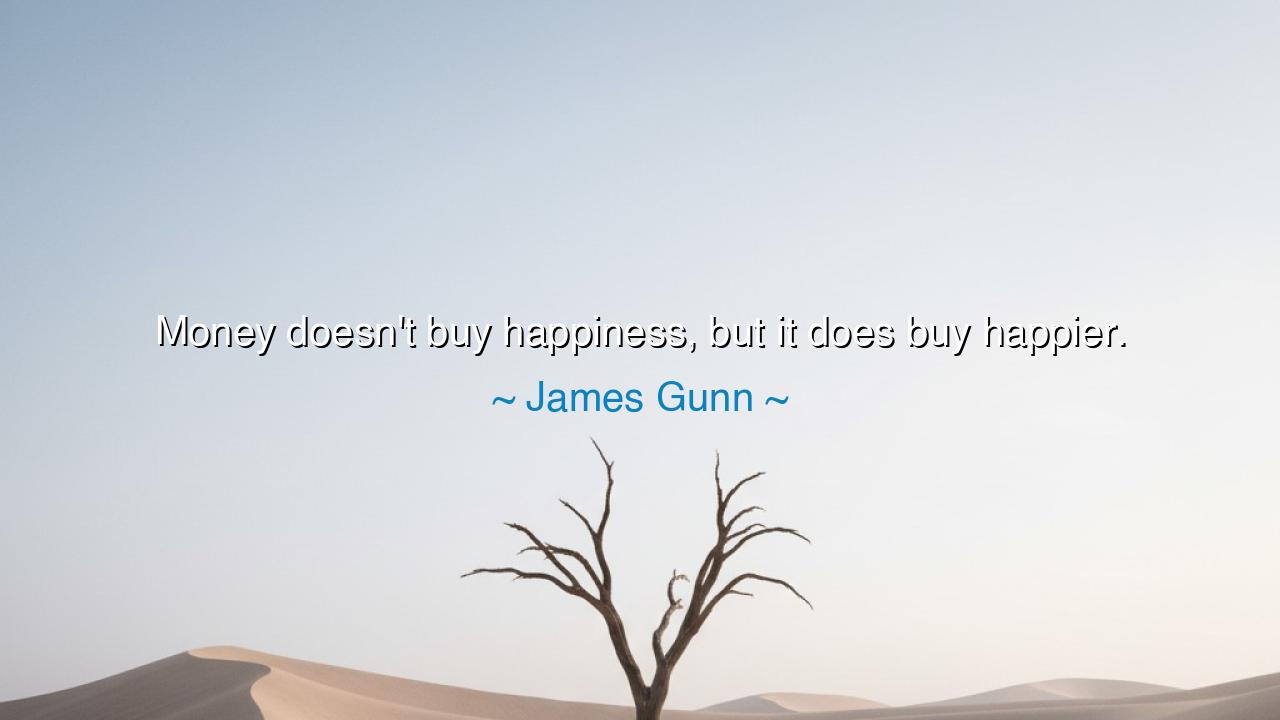
Money doesn't buy happiness, but it does buy happier.






“Money doesn’t buy happiness, but it does buy happier.” Thus spoke James Gunn, with a smile that conceals both humor and truth. His words carry the paradox of modern life—an age where wealth is both a blessing and a burden, where comfort is plentiful but contentment rare. This saying, deceptively simple, bridges two worlds: the material and the spiritual. It acknowledges that money, though powerless to create happiness, can indeed smooth the path toward it—it can purchase relief, opportunity, even moments of joy. Yet beyond those moments, the soul still must labor for peace.
To the ancients, this truth was well known. Epicurus, the philosopher of simple pleasures, taught that wealth is only useful when it removes pain, not when it multiplies desire. For hunger, cold, and fear—these are burdens that cloud the spirit. To possess enough wealth to banish them is not vanity, but wisdom. And so, when James Gunn says that money buys “happier,” he speaks in the same tongue as the sages of old: wealth may not give you joy itself, but it can lessen suffering, and in the absence of suffering, joy may breathe more freely. The farmer who sleeps beneath a roof is no wiser than the one beneath the stars—but he is drier, warmer, and perhaps a little “happier.”
Yet, Gunn’s quote carries a subtle warning as well. For if money buys “happier,” it tempts the human heart to chase an endless ascent—one more comfort, one more luxury, one more distraction. But true happiness does not grow from accumulation; it blooms from gratitude. The wise see that wealth can buy time, security, and ease, but only the heart can fill that time with meaning. The palace and the cottage share the same danger: to fill the emptiness with things, rather than understanding. The man who owns the world and the man who owns nothing may still weep for the same reason—because neither has yet found peace within himself.
Consider the life of Andrew Carnegie, the great industrialist of the 19th century. Born in poverty, he rose to immense wealth, building railroads and empires. Yet, in his later years, he turned his riches toward libraries, schools, and charities. When asked why, he said that a man who dies rich dies in shame. Carnegie had discovered what Gunn’s words suggest—that money, if hoarded, corrupts, but if used to lighten the burdens of others, creates ripples of “happier” far beyond oneself. His generosity did not buy happiness in the purest sense—it bought opportunity, dignity, and hope, which are its necessary foundations.
The ancients would say that money is neither good nor evil—it is a tool. The hand that wields it determines its worth. The miser uses it to build walls; the wise man uses it to open doors. Gunn’s quote, playful yet profound, reminds us that while gold cannot heal the soul, it can feed the body that carries it, and sometimes, in feeding the body, it softens the heart. The danger lies not in wealth, but in worshipping it. For if one believes that happiness can be purchased whole, one will forever live in debt to illusion.
The lesson, then, is this: seek enough, not everything. Let money serve you, not rule you. Use it to ease suffering—your own and that of others—but do not mistake comfort for contentment. When wealth brings you warmth, share that warmth. When it grants you time, use that time for love, for art, for kindness. For happiness, though it cannot be bought, is often built from the conditions that money can provide: safety, health, freedom from fear. Once those are secured, the rest depends upon the cultivation of the soul.
So, remember the wisdom hidden in James Gunn’s humor: money buys happier, not happiness. It may soften the edges of hardship, but it cannot fill the hollow of the heart. True wealth is not measured in gold, but in gratitude; not in possessions, but in peace. Seek first the strength of character that makes joy possible, and let money serve that strength—not replace it. For when the heart is rich, even little becomes much, and when the heart is poor, all the gold in the world will still leave you wanting.






AAdministratorAdministrator
Welcome, honored guests. Please leave a comment, we will respond soon